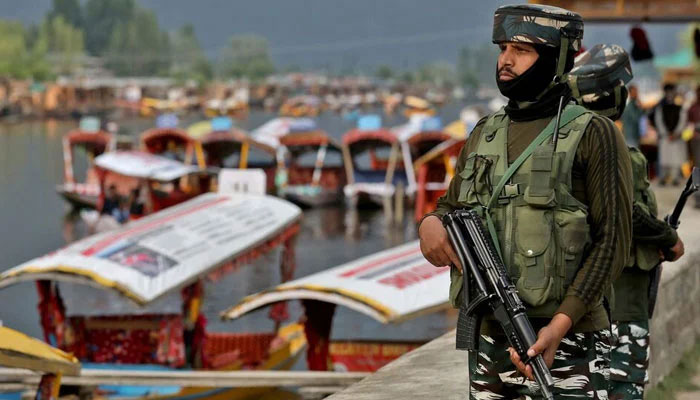Indian villagers on border with Pakistan fear war
Hardev hopes if bellicose statements issued by leaders on either side do turn into military action, his village will be left alone
AMRITSAR: India’s Daoke village is fenced from Pakistan on three sides and 65-year-old resident Hardev Singh, who has lived through multiple wars between the arch-rivals, knows the drill if another erupts.
“All women, children, cattle and most younger men moved back to safe shelters in 1999 and 1971,” Hardev said, referring to two of the worst outbreaks of fighting between the neighbours.
“We couldn’t go to our fields,” he said, adding that it was only the village’s elderly men who “stayed back to ensure that our homes were not looted”.Residents of the frontier villages in India’s Punjab state say nothing has changed on the ground yet — but there is a growing anxiety about the coming weeks.
“The barbaric attack on the civilians in Kashmir was tragic, but no matter what, the lives lost are not coming back,” Hardev said.“Any war would push both our countries back by many years, and there would be an even bigger loss of human lives.” A border fence patrolled by troops slices in two the farmlands near Daoke, home to around 1,500 people.
Gurvinder Singh, 38, recalls the last major conflict in 1999.Fighting then took place far from Punjab — in the icy Himalayan district of Kargil — but the sun-baked fieldsaround his village did not escape unscathed. “Mines were planted on our fields, and we could not work,” Gurvinder said.
He hopes that, if the bellicose statements issued by leaders on either side do turn into military action, his village will be left alone.
“We feel that the actual conflict would happen only in the Himalayas,” Gurvinder said, adding that his village is “normal right now”.In the nearby frontier village of Rajatal, between the Indian city of Amritsar and Lahore in Pakistan, residents remember the days when the golden farmland stretched without restriction.
Sardar Lakha Singh’s memory stretches back to before the fence was erected.“We used to go to the open ground on the other side to graze our cattle,” 77-year-old Lakha said, sitting about 100 metres from fences topped with barbed wire.
Farmers can obtain special passes to go close to the border, including beyond the fence but still within Indian territory. But they must always be accompanied by a soldier.“We can’t go there whenever we want,” said farmer Gurvil Singh, 65. “This reduces the time we get to work on our fields”.
Panic gripped border villages last week after rumours suggested farmers would be stopped from accessing fields too close to Pakistan.Sikh elder Sardar Lakha Singh advised younger villagers to accept their fate and not to worry.
“Whatever is going to happen will happen anyway,” he said.“We didn’t know when the 1965 war suddenly started, same in 1971 when the planes suddenly started crossing the border,” the grey-beared farmer added.
“So, if it happens again, we don’t need to worry in advance.”Gurvinder Singh, 35, said he tried to take the lesson to heart.“It would be a high-tech war, and not an invasion or a battle of swords like the past,” he said.“When the situation worsens, it would be for the entire country -- and not just us.”
-
 Hilary Duff’s Son Roasts Her Outfit In New Album Interview
Hilary Duff’s Son Roasts Her Outfit In New Album Interview -
 Alexandra Daddario, Andrew Form Part Ways After 3 Years Of Marriage
Alexandra Daddario, Andrew Form Part Ways After 3 Years Of Marriage -
 Eric Dane Rejected Sex Symbol Label
Eric Dane Rejected Sex Symbol Label -
 Avan Jogia Says Life With Fiancee Halsey Feels Like 'coming Home'
Avan Jogia Says Life With Fiancee Halsey Feels Like 'coming Home' -
 Kate Middleton's Role In Handling Prince William And Harry Feud Revealed
Kate Middleton's Role In Handling Prince William And Harry Feud Revealed -
 Tucker Carlson Says Passport Seized, Staff Member Questioned At Israel Airport
Tucker Carlson Says Passport Seized, Staff Member Questioned At Israel Airport -
 David, Victoria Beckham Gushes Over 'fiercely Loyal' Son Cruz On Special Day
David, Victoria Beckham Gushes Over 'fiercely Loyal' Son Cruz On Special Day -
 Taylor Swift Made Sure Jodie Turner-Smith's Little Girl Had A Special Day On 'Opalite' Music Video Set
Taylor Swift Made Sure Jodie Turner-Smith's Little Girl Had A Special Day On 'Opalite' Music Video Set -
 Eric Dane Says Touching Goodbye To Daughters Billie And Georgia In New Netflix Documentary
Eric Dane Says Touching Goodbye To Daughters Billie And Georgia In New Netflix Documentary -
 Channing Tatum Reveals What He Told Daughter After Violent Incident At School
Channing Tatum Reveals What He Told Daughter After Violent Incident At School -
 King Charles Lands In The Line Of Fire Because Of Andrew Mountbatten-Windsor
King Charles Lands In The Line Of Fire Because Of Andrew Mountbatten-Windsor -
 Denise Richards Doubles Down On Abuse Claims Against Ex Husband Aaron Phypers Amid Show Return
Denise Richards Doubles Down On Abuse Claims Against Ex Husband Aaron Phypers Amid Show Return -
 Russia Set To Block Overseas Crypto Exchanges In Sweeping Crackdown
Russia Set To Block Overseas Crypto Exchanges In Sweeping Crackdown -
 Gwyneth Paltrow Reveals Deep Personal Connection With Kate Hudson
Gwyneth Paltrow Reveals Deep Personal Connection With Kate Hudson -
 Prince Harry, Meghan Markle’s Game Plan For Beatrice, Eugenie: ‘Extra Popcorn For This Disaster’
Prince Harry, Meghan Markle’s Game Plan For Beatrice, Eugenie: ‘Extra Popcorn For This Disaster’ -
 OpenAI To Rollout AI Powered Smart Speakers By 2027
OpenAI To Rollout AI Powered Smart Speakers By 2027




